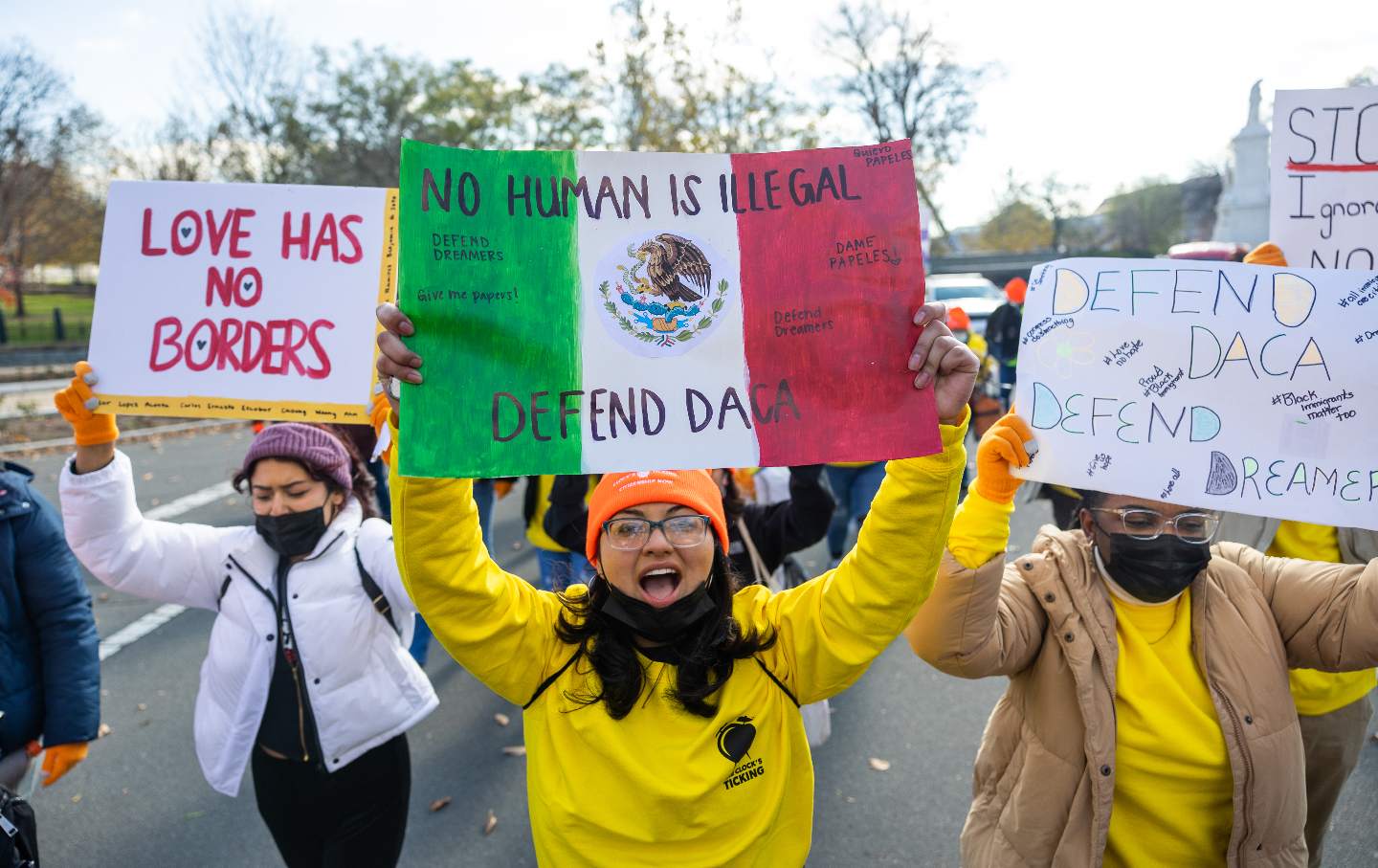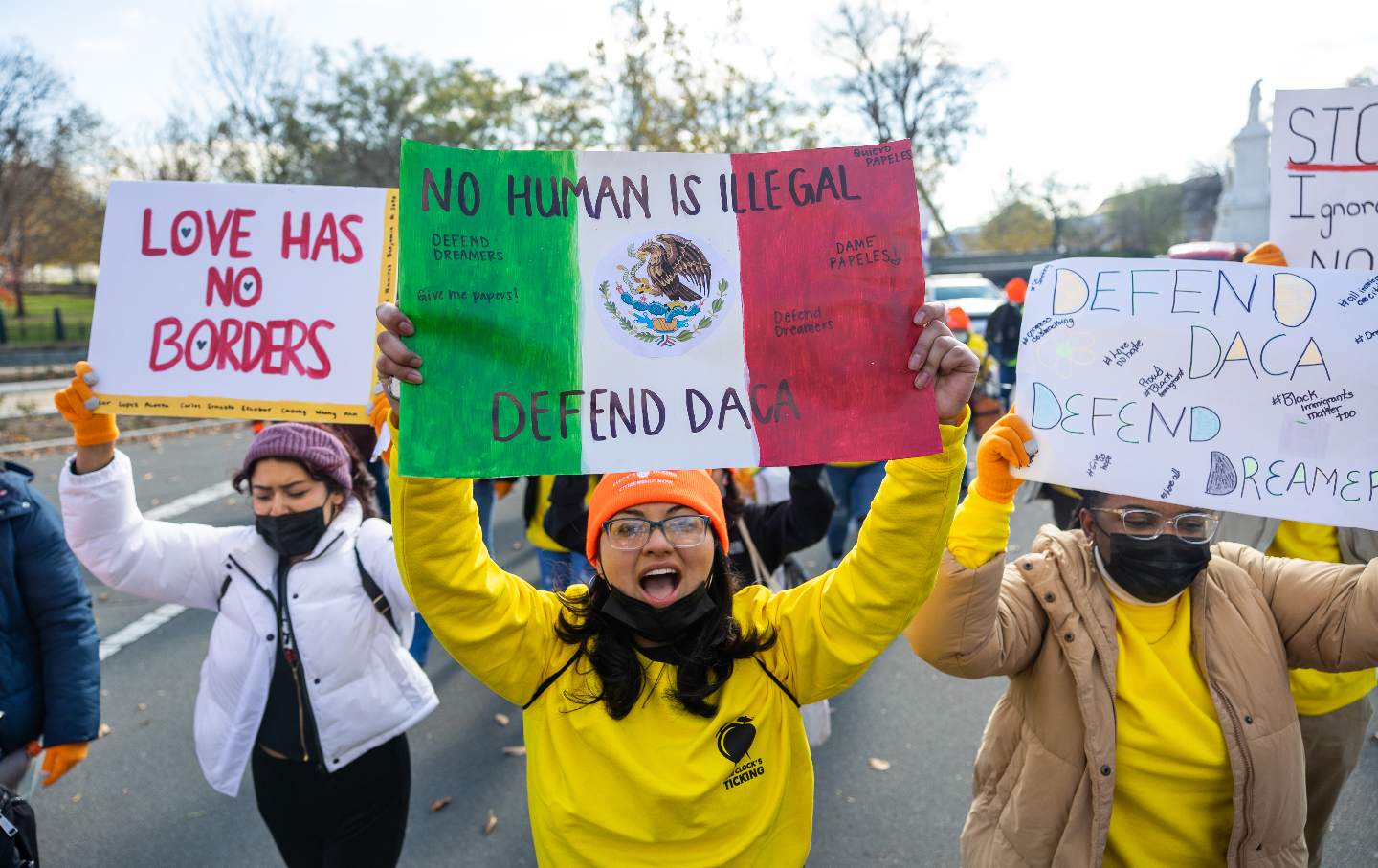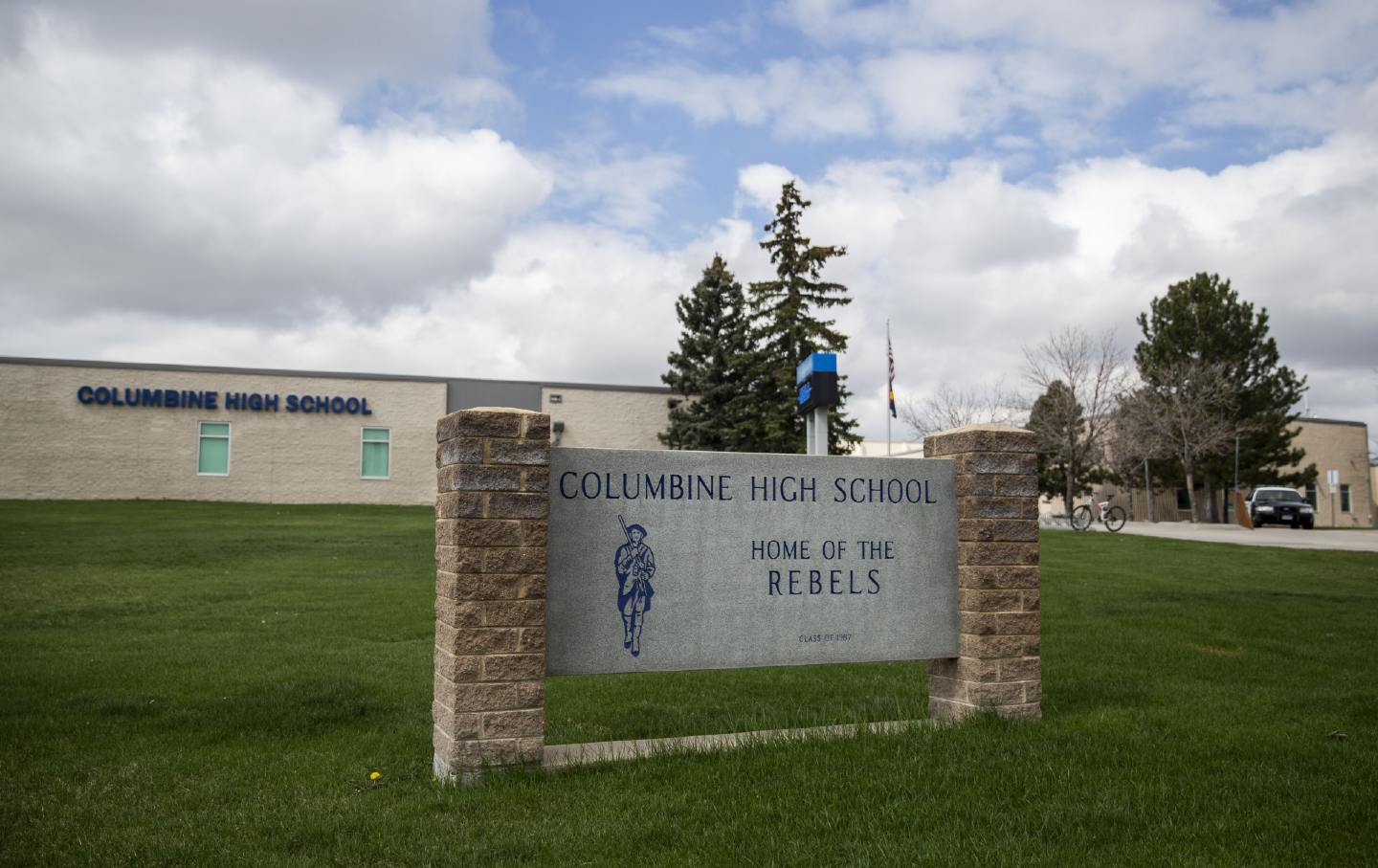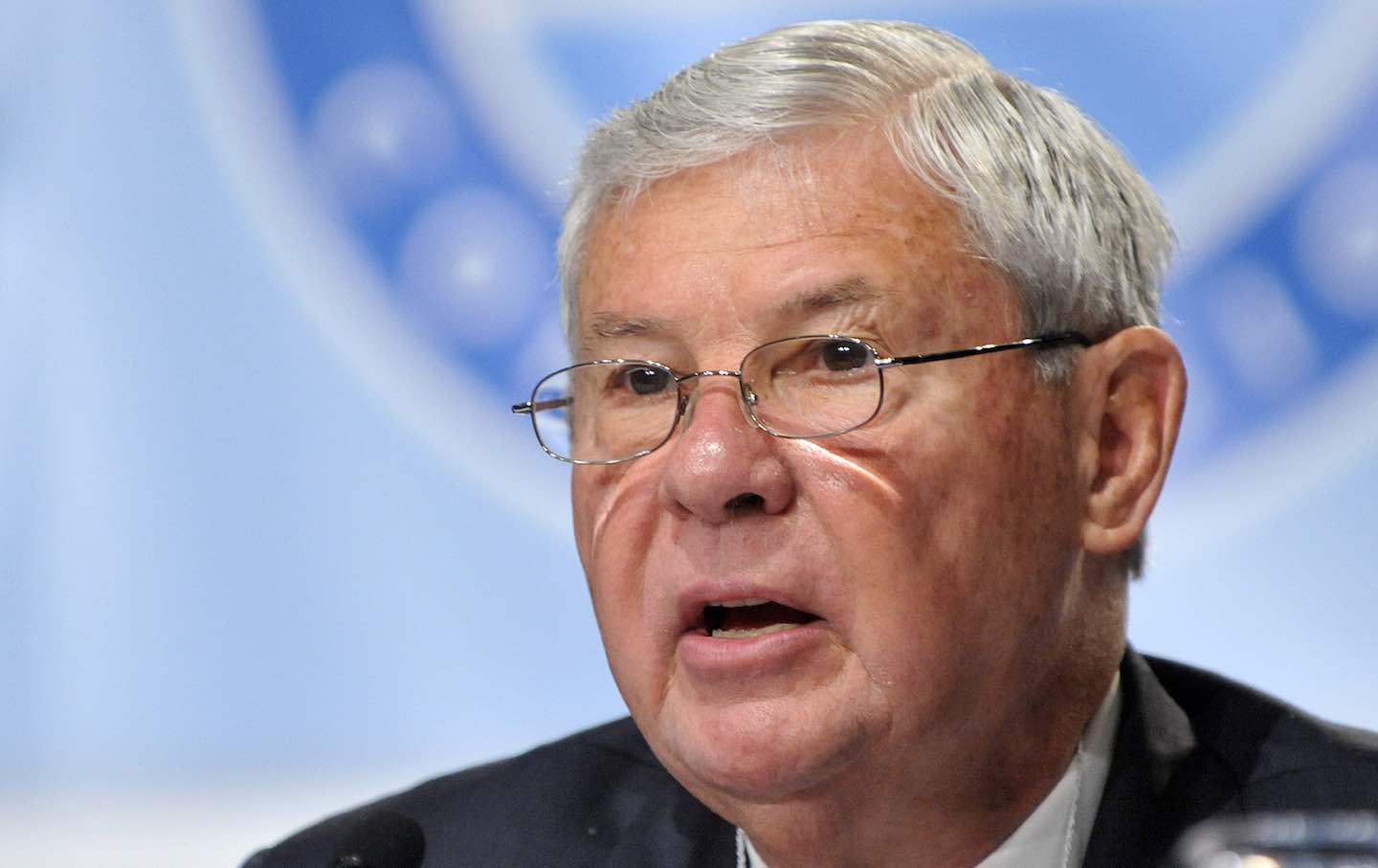
[ad_1]
Politics
/
StudentNation
/
April 24, 2024
Around 80 percent of the nearly 120,000 undocumented students who graduated high school in 2023 don’t qualify for DACA.

Pro-DACA protesters hold a march outside the US Capitol.
(Nathan Posner / Getty)
At age 15, Luis came to the United States from Veracruz, Mexico. Today, he’s a 22-year-old senior at Rice University, studying math and planning to go to graduate school next fall.
His grandparents are US citizens, and his mom has applied for a green card. Since Luis was brought into the US as a minor, you might think he qualifies for Deferred Action for Childhood Arrivals (DACA), which shields young adults who arrived in the US as children from being deported, offering them work authorization along with temporary and renewable legal status. “I checked all the boxes, except for one,” said Luis, “which is that you have to have been here since 2007.”
Around 80 percent of the nearly 120,000 undocumented students who graduated high school in 2023 do not qualify for DACA, and even fewer undocumented high school graduates will qualify this spring. Yet nearly three-fourths of Americans are in favor of “granting permanent legal status to immigrants who came to the US illegally as children.” Despite its popularity, when Obama tried to update the program to include those who had been present in the US since 2010, it was challenged in court by Texas and 25 other states, arguing that it was an overstep of presidential authority. In 2016, the Supreme Court upheld this view, leading to the Obama administration rescinding the update.
Current Issue

For a current minor to be under 18 when they came into the United States, the earliest they could have arrived is 2005. According to the President’s Alliance on Higher Education and Immigration, this means a majority of undocumented students entering higher education are no longer eligible for DACA. “That number is going to continue to decline, and the population [of those eligible for DACA] is going to get smaller because they’re not updating [the policy],” said Dr. Felecia Russell, director of the Higher Education Portal at the President’s Alliance and former Dreamer.
Sam is a 20-year-old undocumented student who qualified for DACA but wasn’t able to apply before the Trump administration terminated the program in 2017. In 2020, the Supreme Court decided that cancellation was unconstitutional, but did not give a clear directive on the constitutionality of DACA itself. Currently, no new DACA applications can be processed, and only current DACA holders can apply for renewal.
Sam said that not being allowed to file was heartbreaking. “I remember being very upset and emotional. I was 14 and in high school, and I just thought, ‘My one chance of living a normal life, completely shot in front of me,’” she said. For her, being undocumented “feels like you can never truly relax. Things tomorrow could get worse.”
People like Sam are left without a Social Security number, making it harder to find work. In high school, she was able to get a job at a Mexican restaurant, but they had to pay her in cash. Most internships are also off the table. Evelyn, an undocumented student whose dream is to work at NASA, can’t even apply. “At the end of the day, you could have the most stellar degree, but if you have zero experience, it’s going to be really tough to find a job,” she said.
Sam was able to get an unpaid internship at a law firm. But because Texas, like most states, doesn’t allow undocumented individuals to apply for a driver’s license, she had to give it up. “I can’t ask my friends for a ride every single day. I can’t afford to take an Uber every single day, and the public transportation in Houston is not good, efficient, or reliable.”
“If you can’t work, you can’t contribute to your education. One way that a lot of students pay for their education is by having a job on campus or by doing work study,” said Russell. But undocumented students also face barriers to taking out loans and cannot apply for scholarships that require applicants to be US citizens or legal permanent residents. “We know that the biggest barrier to higher education for people in general is the cost. Now, here’s a group of folks who cannot access federal financial aid, along with states that don’t provide undocumented students with access to in-state tuition rates,” said Russell.
In 2021, undocumented students made up less than 2 percent of the population of students enrolled in post-secondary education programs, compared to around 6 percent in 2019. “The only university that was giving really good financial aid [to undocumented students] in Texas was Rice,” said Luis, who completed two years at a community college before transferring. Outside of Texas, the schools that offered substantial aid were private schools or Ivy Leagues. “My brother is also undocumented. He’s a freshman in high school right now,” said Luis. “I feel worried because what if he doesn’t get into these colleges? We have to be perfect students in order for us to get opportunities.”
Ad Policy
The problem, as Russell puts it, is that “DACA itself was never a permanent fix.” The policy was a result of the Obama administration’s taking unilateral action because Congress did not pass the Development, Relief, and Education for Alien Minors (DREAM) Act, which would have granted similar protections to undocumented individuals brought into the US as minors. President Biden has voiced support for DACA and moved to expand federal health insurance programs to current DACA holders, but has not moved towards an update of the policy.
Now, according to Russell, we need to turn back to Congress. The American Dream and Promise Act, which would expand DACA protections for millions, was introduced again last June. The bill previously passed the House in 2019 and 2021 but has yet to pass the Senate.
But an expansion won’t apply to any undocumented individual brought in as a child in perpetuity. “Under the American Dream and Promise Act, you have continuously lived in the US since January 1, 2021, and it would be great if we could get it into law,” Russell said. “No policy is going to be perfect. This one is not perfect, but it is good.”
Popular
“swipe left below to view more authors”Swipe →
As a former undocumented student herself, Russell said she had no autonomy over her life. “I couldn’t drive, I couldn’t get a driver’s license, and I couldn’t get a job on campus, even though I needed one terribly,” she said. “Probably all the things that I’m doing, or the things I’ve accomplished, I would not have done without this policy.”
Sam, who came to the US at 3 years old, recently spoke to a lawyer about her situation. “They told me that my only true pathways to citizenship would be: Congress intervenes and passes something, I get married, or I return to my country of birth for at least 10 years and try to get in the so-called ‘right way,’” she said. “Hearing that—I always knew these things were true—but hearing that spoken out loud by a legal professional broke something in me.”
Thank you for reading The Nation!
We hope you enjoyed the story you just read. It’s just one of many examples of incisive, deeply-reported journalism we publish—journalism that shifts the needle on important issues, uncovers malfeasance and corruption, and uplifts voices and perspectives that often go unheard in mainstream media. For nearly 160 years, The Nation has spoken truth to power and shone a light on issues that would otherwise be swept under the rug.
In a critical election year as well as a time of media austerity, independent journalism needs your continued support. The best way to do this is with a recurring donation. This month, we are asking readers like you who value truth and democracy to step up and support The Nation with a monthly contribution. We call these monthly donors Sustainers, a small but mighty group of supporters who ensure our team of writers, editors, and fact-checkers have the resources they need to report on breaking news, investigative feature stories that often take weeks or months to report, and much more.
There’s a lot to talk about in the coming months, from the presidential election and Supreme Court battles to the fight for bodily autonomy. We’ll cover all these issues and more, but this is only made possible with support from sustaining donors. Donate today—any amount you can spare each month is appreciated, even just the price of a cup of coffee.
The Nation does not bow to the interests of a corporate owner or advertisers—we answer only to readers like you who make our work possible. Set up a recurring donation today and ensure we can continue to hold the powerful accountable.
Thank you for your generosity.
Lajward Zahra
Lajward Zahra is a freshman at Rice University, originally from El Paso, Tex., reporting on public policy and culture. Her work has been seen in The City Magazine, PRISM Reports, and Muslim Girl.
More from The Nation

After a vote in favor of sending $95 billion to Ukraine, Israel, and Taiwan passed, far right Republicans are threatening a motion to vacate the speaker of the house.
Chris Lehmann

His true addiction explains the president’s doziness.
Jeet Heer

A pair of special-election landslides proves that the party is doing something right.
John Nichols

With the National Rifle Association now weaker than it has been in decades, progress is possible—if politicians are willing to seize the time.
Peter Dreier

The former Senate Intelligence Committee chair saw through Republican efforts to manipulate Congress into authorizing a war that should never have been fought.
John Nichols
[ad_2]
Anas Suleiman
Hmm
Ahmed Ibrahim
OK na